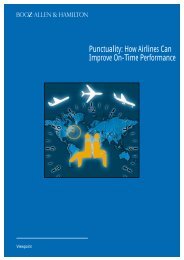The sentence
The sentence
The sentence
You also want an ePaper? Increase the reach of your titles
YUMPU automatically turns print PDFs into web optimized ePapers that Google loves.
<strong>The</strong> present participle in place of relative clauses<br />
1. We can sometimes omit who or which + is/are when we use the present progressive.<br />
Instead of: <strong>The</strong> man who is serving at the counter is very helpful.<br />
We can say: <strong>The</strong> man serving at the counter is very helpful.<br />
Instead of: <strong>The</strong> new law applies to vehicles which are carrying heavy loads.<br />
We can say: <strong>The</strong> new law applies to vehicles carrying heavy loads.<br />
2. We can sometimes use –ing in place of who or which + simple present:<br />
Instead of: This job will suit students who want to work during the holidays.<br />
We can say: This job will suit students wanting to work during the holidays.<br />
L. <strong>The</strong> complex <strong>sentence</strong>: perfect/past participle constructions<br />
‘Being’ and ‘having been’<br />
1. We sometimes use being in place of is, are, was or were, though this is often formal:<br />
Instead of: I was lost, so I had to ask someone the way.<br />
We can say: Being lost, I had to ask someone the way.<br />
2. We sometimes use having been in place of have been or had been (also formal):<br />
Instead of: I’ve been abroad, so I missed the elections.<br />
We can say: Having been abroad, I missed the elections.<br />
‘It being’ and ‘there being’<br />
1. We sometimes use it being in place of it is or it was (formal):<br />
Instead of: It was Sunday, so it was hard to find a garage open.<br />
We can say: It being Sunday, it was hard to find a garage open.<br />
2. We sometimes use there being in place of there is or there was (formal)<br />
Instead of: <strong>The</strong>re was so much noise, I couldn’t hear what was going on.<br />
We can say: <strong>The</strong>re being so much noise, I couldn’t heat what was going on.<br />
3. We can use it being and there being after without (formal):<br />
<strong>The</strong>y often dig up the roads without it being necessary. (= it isn’t necessary)<br />
She suddenly began shouting without there being any reason. (= there was no reason)<br />
Agreement between present participle and subject<br />
We have to be very careful to make the participle agree with the subject of both verbs:<br />
Turning the corner, I saw a tile fall off the roof. (= I turned … and I saw …)<br />
If we say or write *Turning the corner, the tile fell off the roof*, this means ‘the tile was<br />
turning the corner and then fell off the roof’. <strong>The</strong> <strong>sentence</strong> is nonsense!<br />
Past participle constructions<br />
1. <strong>The</strong> past participle is the third part of a verb:<br />
play – played – played (regular verbs); build – built – built (irregular verbs)<br />
10




